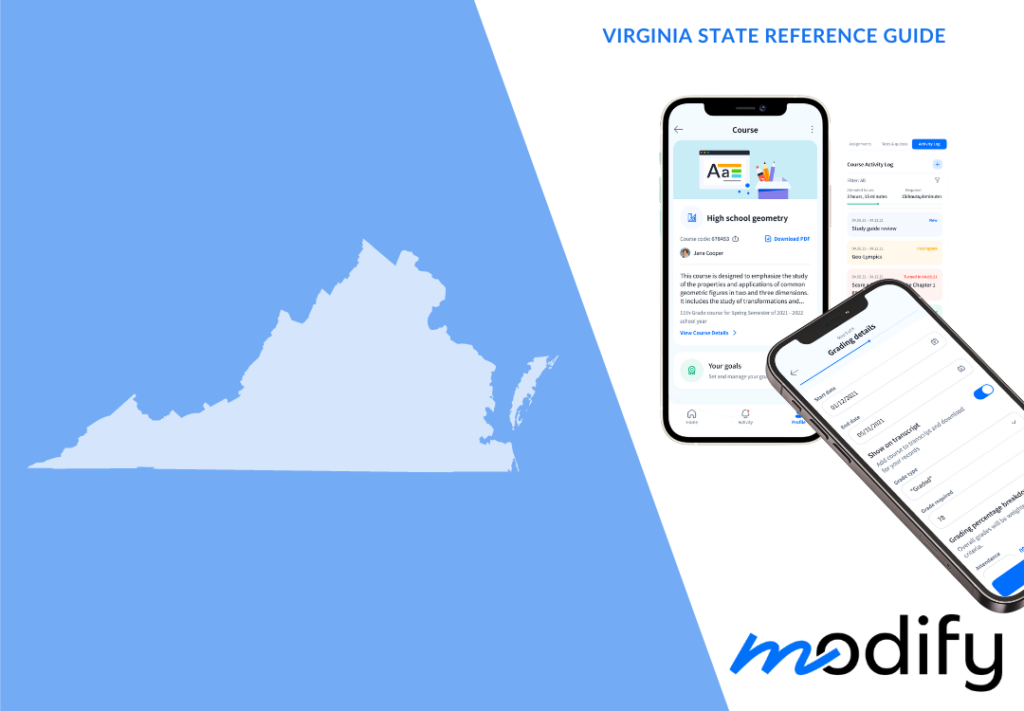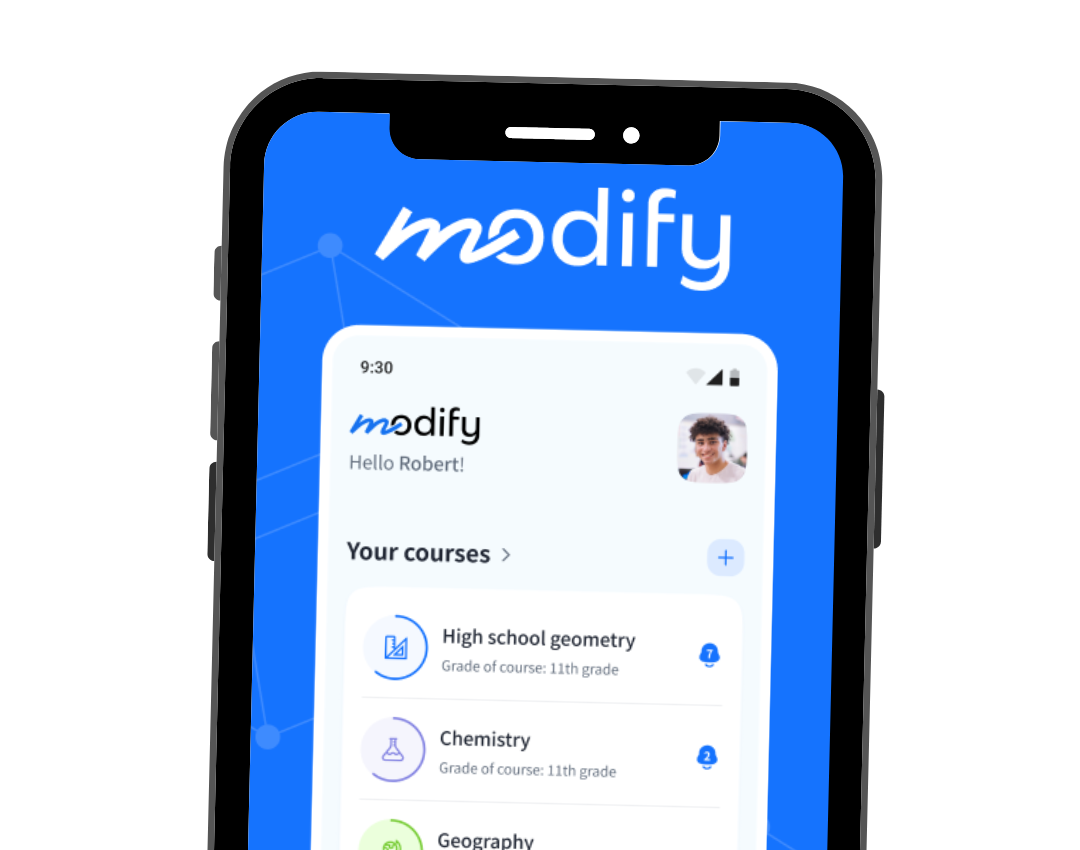Virginia Homeschool Laws
Homeschooling in Virginia
How do I start homeschooling?
Follow these four steps to homeschooling in the state of Virginia:
Decide which scenario you will homeschool under (there are 3 legal options in the state)
File your notice of intent to homeschool with your local school division.
Choose a homeschool method/curriculum that suits your family.
Modify™ can help you with your tracking, portfolio and record keeping. Download the app today.
Enjoying learning together!
Homeschool Laws
According to Virginia Code § 22.1-254, “Except as otherwise provided in this article, every parent, guardian, or other person in the Commonwealth having control or charge of any child who will have reached the fifth birthday on or before September 30 of any school year and who has not passed the eighteenth birthday shall, during the period of each year the public schools are in session and for the same number of days and hours per day as the public schools, cause such child to attend a public school or a private, denominational, or parochial school or have such child taught by a tutor or teacher of qualifications prescribed by the Board of Education and approved by the division superintendent, or provide for home instruction of such child as described in § 22.1-254.1.”
Thus, home instruction is one way to satisfy Virginia’s compulsory school attendance requirement.
What do I need to be eligible to be a homeschool parent?
According to § 22.1-254.1, “Any parent of any child who will have reached the fifth birthday on or before September 30 of any school year and who has not passed the eighteenth birthday may elect to provide home instruction in lieu of school attendance if he
- holds a high school diploma;
- is a teacher of qualifications prescribed by the Board of Education;
- provides the child with a program of study or curriculum which may be delivered through a correspondence course or distance learning program or in any other manner; or
- provides evidence that he is able to provide an adequate education for the child.”
See the Home Instruction Handbook on the Home Instruction page of the Virginia Department of Education website for more details on these requirements and for considerations when choosing a correspondence program or distance learning program.
As another option, “Section 22.1-254 of the Code of Virginia allows parents to have their children taught by a tutor or a teacher who meets the teacher licensure qualifications prescribed by the Board of Education when that individual has been approved as a tutor by the school division superintendent. To meet the qualifications prescribed by the Board of Education, the tutor must have a valid Virginia teaching license in any area and may be a parent who meets the tutor qualifications” (Virginia Department of Education).
Do I need to notify the school district of my intent to homeschool my child?
Yes! “Any parent who elects to provide home instruction in lieu of school attendance shall annually notify the division superintendent in August of his intention to so instruct the child and provide a description of the curriculum, limited to a list of subjects to be studied during the coming year, and evidence of having met one of the criteria for providing home instruction. Effective July 1, 2000, parents electing to provide home instruction shall provide such annual notice no later than August 15. Any parent who moves into a school division or begins home instruction after the school year has begun shall notify the division superintendent of his intention to provide home instruction as soon as practicable and shall thereafter comply with the requirements of this section within 30 days of such notice” (§ 22.1-254.1).
A Sample Notice of Intent to Provide Home Instruction is provided on the Virginia Department of Education’s website.
What educational options are available to my homeschooler?
As a homeschooler in Virginia, you do have options. According to the Virginia Department of Education, “Section 22.1-253.13:2.N of the Code of Virginia allows school boards to permit part-time attendance of children receiving home instruction under the provisions of § 22.1-254.1 of the Code of Virginia. Home instructed part-time students may be allowed to enroll in classes in English, mathematics, science, history, social science, foreign language, career and technical education, health education, physical education, or fine arts. School boards may permit students receiving home instruction to enroll in any other courses. Parents are advised to check with local school divisions regarding this issue.
Children who are being tutored under the provisions of § 22.1-254 of the Code of Virginia or have received a religious exemption under those provisions are not eligible to enroll in a public school on a part-time basis.”
Homeschool Requirements
Even though Virginia does not highly regulate homeschooling, there are some Virginia homeschool requirements you must satisfy when you homeschool:
- Begin homeschooling by age 5.
- File the required annual notice of the intent to homeschool to the division superintendent by August 15 (or as soon as possible if beginning after the start of the school year).
- Provide instruction for “the same number of days and hours per day as the public schools” (§ 22.1-254).
- Submit evidence of academic progress at the end of the school year by August 1.
- Stay current with homeschooling laws and requirements.
Do I need to administer testing to my homeschooler?
“The parent who elects to provide home instruction shall provide the division superintendent by August 1 following the school year in which the child has received home instruction with either
- evidence that the child has attained a composite score in or above the fourth stanine on any nationally normed standardized achievement test, or an equivalent score on the ACT, SAT, or PSAT test or
- an evaluation or assessment which the division superintendent determines to indicate that the child is achieving an adequate level of educational growth and progress, including but not limited to
- an evaluation letter from a person licensed to teach in any state, or a person with a master’s degree or higher in an academic discipline, having knowledge of the child’s academic progress, stating that the child is achieving an adequate level of educational growth and progress or
- a report card or transcript from an institution of higher education, college distance learning program, or home-education correspondence school” (§ 22.1-254.1).
“School boards shall make Advanced Placement (AP), Preliminary SAT/National Merit Scholarship Qualifying Test (PSAT/NMSQT), and PreACT examinations available to students receiving home instruction […]. School boards shall adopt written policies that specify the date by which such students shall register to participate in such examinations. School boards shall notify such students and their parents of such registration deadline and the availability of financial assistance to low-income and needy students to take such examinations” (§ 22.1-254.1).
What happens to my child’s annual testing results?
Per § 22.1-254.1, for every child over the age of six as of September 20 of the school year: “In the event that evidence of progress […] is not provided by the parent, the home instruction program for that child may be placed on probation for one year. Parents shall file with the division superintendent evidence of their ability to provide an adequate education for their child […] and a remediation plan for the probationary year which indicates their program is designed to address any educational deficiency. Upon acceptance of such evidence and plan by the division superintendent, the home instruction may continue for one probationary year. If the remediation plan and evidence are not accepted or the required evidence of progress is not provided by August 1 following the probationary year, home instruction shall cease and the parent shall make other arrangements for the education of the child which comply with § 22.1-254.”
“Any party aggrieved by a decision of the division superintendent may appeal his decision within 30 days to an independent hearing officer. The independent hearing officer shall be chosen from the list maintained by the Executive Secretary of the Supreme Court for hearing appeals of the placements of children with disabilities. The costs of the hearing shall be apportioned among the parties by the hearing officer in a manner consistent with his findings” (§ 22.1-254.1).
What records do I need to keep when I homeschool my child?
In Virginia, there is little required recordkeeping. According to § 22.1-271.4, parents must keep immunization records: “Parents are required to provide the information upon request unless the parents submit an affidavit stating that immunization conflicts with their religious beliefs or the parents provide a doctor’s statement indicating that one or more of the required immunizations is detrimental to the child’s health” (Virginia Department of Education).
In addition to this minimal required recordkeeping, we also recommend you do some personal recordkeeping to provide verification of education in the event you would need to show some form of educational proof to the state or other legal entities or to prepare for re-entry into public school or postsecondary pathways. This includes the following:
- Attendance
- Immunization records, required
- Lists of texts and workbooks used
- Student schoolwork samples and/or portfolios
- Test and evaluation results
- Correspondence with school officials
You may also be able to find more information on Virginia homeschool requirements through your local school division.
Record Keeping
When using the Home Education Statue option in Virginia, parents have specific information they need to submit to their school district annually to show evidence of academic progress . This evidence can take one of two formats:
- results from a nationally normed standardized test
- an evaluation or assessment
For those choosing the standardized test format, Virginia homeschool law specifies that students must have “a composite score in or above the fourth stanine on any nationally normed standardized achievement test; or an equivalent score on the ACT, SAT, or PSAT test.” For those choosing the evaluation/assessment option, this could be a letter from a Virginia certified teacher who has reviewed the child’s academic progress or it could be a report card/transcript from a community college, correspondence school, etc.
The Modify™ app makes record keeping simple and keeps all your records organized.
Graduation requirements
Virginia homeschool law has no specific guidelines in terms of homeschool graduation, which means that there is nothing you need to do–from a legal standpoint–to show that your teen has completed a specific course of study.
If you have a child that is college bound it is always a good idea to keep records, portfolios and transcripts, all of these and more can be done on the Modify™ app.

REFERENCE GUIDE:
Virginia Code § 22.1-254
Home Instruction
Sample Notice of Intent to Provide Home Instruction
Local School Division
Note: All information on this site is provided with no guarantee of accuracy. Modify™ is not responsible for any errors, omissions, or outdated information, or for the results yielded through use of this information.





